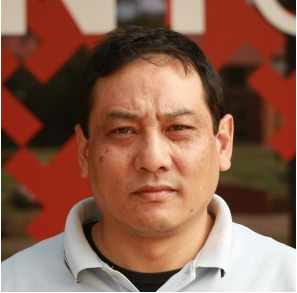Samir started his professional career working with the UNDP promoting sustainable mini grids in rural Nepal after completing his Bachelors in Electrical and Electronics Engineering from Bangalore University, India. While working for UNDP, he received a coveted DAAD scholarship to complete his Masters in Energy Systems and Management from Flensburg University, Germany. After completing his Masters, he started working for Winrock International as a Research Officer to implement action research projects to enhance the use of clean energy in the agriculture and forestry value chain. He then got the opportunity to work with the Alternative Energy Promotion Centre, the focal agency for renewable energy and energy efficiency promotion in Nepal. In AEPC, he was instrumental in establishing its Climate and Carbon Finance Unit, expanding the domestic biogas sector to include larger waste to energy initiatives, and initiating partnership with the academic institutions e.g., Duke University and Kathmandu University to research on the sustainable impacts of domestic biogas. He has a PhD in Business from Charles Sturt University, Australia as part of the Australia Awards program. Samir has the skillset to use quantitative (non-market valuation, panel data analysis, detailed feasibility) and qualitative (landscape and case study analysis) research methods, and has extensive experience in survey design, data analysis, report writing. He also has program/project management experiences related to energy access with a focus on financing, productive end-use, gender & social inclusion, and decentralization/devolution. Samir is a member of the Australasian Agriculture and Resource Economics Society (AARES) and the South Asian Network for Development and Environmental Economics (SANDEE).
Samir is part of the MECS Finance team and researches the potential of impact/outcome financing (e.g., carbon and health) MECS vis a vis the wider financing eco-system. He is involved in 1) understanding the value chain impacts of cooking fuel and technologies and the cost-efficient way e.g., digital monitoring to introduce and streamline those impacts e.g., PM2.5 vs BC in the carbon/outcome methodologies and 2) in analysing the potential of structuring carbon revenues as environmental incentives vis a vis interest subsidies and purchase subsides to scale up domestic biogas adoption in Nepal to meet its Nationally Determined Contributions. Previously, he also worked on a SANDEE research grant to analyse market competition in the domestic biogas sector in Nepal. He is interested in valuing energy and environmental services and their integration into systems modelling from an efficiency and equity perspective, including design, analysis and implementation of program and policy frameworks for scaling up such services.
Samir has experience of lecturing and supervising students of Masters of International Development and Cooperation program, Mid-Western University in Nepal. The materials prepared for and taught were related to 1) historical, institutional and regional influences to East Asian Growth with regards to how East Asian countries used trade, cooperation and competition policies to shift from agriculture to industrial economies and 2) socio-economic aspects in South Asia in relation to the status of cooperation vis a vis comparative advantages of the South Asian countries and inequality in South Asia with regards related to drivers around circumstances, opportunities, mobility and social support.
Journal Article
- Thapa, S., Morrison, M., & Parton, K. A. (2021). Willingness to pay for domestic biogas plants and distributing carbon revenues to influence their purchase: A case study in Nepal. Energy Policy, 158, 112521. doi:https://doi.org/10.1016/j.enpol.2021.112521
- Sapkota, T., Aryal, J., Thapa, S., & Karki, A. B. (2012). Biogas production from anaerobic digestion of different biodegradable materials. Nepal journal of science and technology, 13(2), 123-128.
Opinion Piece
- Thapa, S., Going to waste, The Kathmandu Post, Nepal, 07/07/2014. https://kathmandupost.com/opinion/2014/07/11/going-to-waste
- Thapa, S., Sharing the carbon revenues: The case of Nepal and the benefits for low carbon development, Governance for Clean Development Project, University of East Anglia. 03/2010.
Reports
- Thapa, S., (2021). Strategy and Project Plan to Deliver Carbon
- Financing for the Safa Tempo and Electric Vehicle Sector, Kathmandu, Nepal. Aloi Technologies, Nepal.
- Thapa, S., Rai, P., K.C., S., & Shah, S. (2021). Secondary waste assessments for large-scale biogas plants in Nepal. Global Green Growth Institute, Nepal.
- Wright, S., Thapa, S., Poudel, B., & Miao, L. (2020). Feasibility study of waste-to-energy for Wagga Wagga City Council, Stage 1 & 2, New South Wales. Charles Sturt University. Australia.
- Soraiya, M., Xian, X., Thapa, S., Munankami, R., & Mora, D. (2002). Potential of biomass use for heating requirements in the Island of Eigg, Lochaber Enterprises, Scotland. Flensburg University. Germany.
